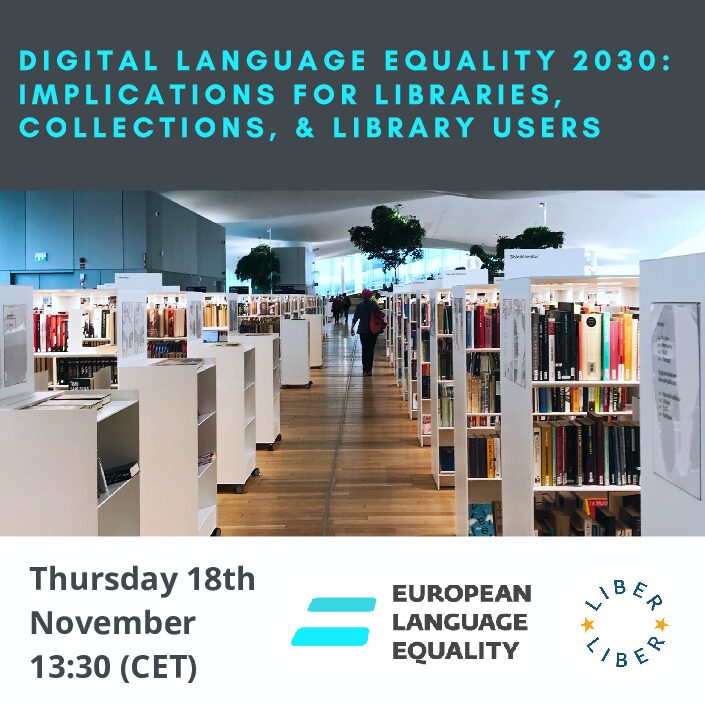
Achieving Digital Language Equality 2030: Implications for Libraries, Collections, and Library Users
How does your library use digital search tools, translation technology, speech recognition, and spell checkers? Would there be room for such tools in your digital infrastructure, and how would language equality affect these services?
THE VISION OF THE ELE PROJECT
The ELE project aims to create the European Language Equality Programme, in the form of a strategic research, innovation, and implementation agenda, as well as a roadmap for achieving full digital language equality in Europe by 2030.
LIBER participates in the ELE project to ensure that the voice of the research library community is heard, as the path towards digital language equality is drawn. This is your chance to participate in shaping Europe’s language equal future.
WORKSHOP DESCRIPTION
In this online workshop, you will hear speakers from the ELE project and practitioners working with language technology. They will paint a picture of what the ELE project is trying to achieve and what a future entailing language equality throughout Europe looks like. Participating in this session will also give you the opportunity to share what impact this could have on your institution, its services, collection, and users.
SPEAKERS
The session will be chaired by Dr Maria Eskevich, Central Office Coordinator of CLARIN. She has a background in language and speech technologies, information retrieval and evaluation, and digital humanities. Joining her will be two speakers: Dr German Rigau and Jean-François Nominé.
Dr Rigau is member of the Ixa research group and deputy director of HiTZ, the Basque Center for Language Technology, based in San Sebastian, Basque Country. He co-leads an established research center that focuses on the development and advancement of language technology. In addition, he is a is core partners of the ELE project.
Jean-François Nominé is a translator at the Institute for scientific and technological information (Inist). Inist is a research support unit of the French National Scientific Research Centre (CNRS). In 2020, he contributed to a working group and report on translation and scholarly communication. This report partly foreshadowed the experimentation with translation services presented in the French Second National Plan for Open Science – 2021-2024.
WORKSHOP OBJECTIVES
The workshop is designed to achieve two main objectives: (1) to familiarise you with the work of ELE and map out what digital language equality could look like in the library sector; and (2) collect your input and hear how digital language equality would affect your institution.
During the session, we require your participation to think through what language equality means for research libraries. This will allow us to report back to the project and build the strategic roadmap to European language equality with your input. This is a unique opportunity to voice the research library perspective and help position research libraries at the forefront of the ELE strategy implementation.
Register for this event here.
[Photo by Kseniya Konovets on Unsplash ]